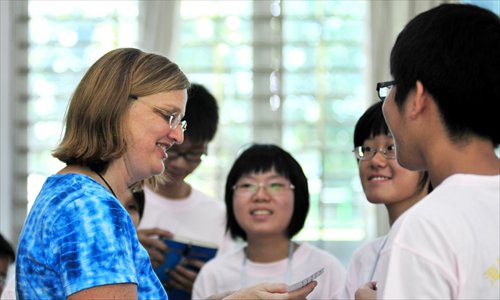HOME >> CHINA
Best classes money can buy
By Liu Xin Source:Global Times Published: 2015-6-14 19:23:01
International curriculum to vanish from China’s public schools

Photo:CFP
While most seniors in high schools are nervously awaiting the results for the national college entrance exams they wrote on June 7, Gao Ge, a graduate of Shanghai Datong High School, can relax. He has already received offers from many universities, including Carnegie Mellon and Tufts.
Gao is one of the first graduates of the Vermont International Academy program in the school, which offers American-style high-school education to Chinese students.
Gao will also be one of the last graduates of the program.
Beijing and Guangzhou have announced that they will no longer approve international programs like Gao's in public high schools. Shanghai has reportedly made the same decision.
The programs have become controversial because they take place in public schools and use public resources, but charge extremely high fees and are used by parents with enough money to send their kids overseas to study.
Government restriction
More than 93,000 students in China chose to go to US universities for their undergraduate studies in 2013, according to a report released last year by China's largest educational website, eol.com.
International programs at public schools have become a popular way for high school students to prepare for overseas studies, especially among parents who are well educated and can afford the fees.
"The good reputation and high quality of teaching faculties in some public schools in big cities make them the first choice for these parents," a teacher surnamed Chen, who works for an international program in a public school in Shanghai, told the Global Times.
There were 11 public and 10 private high schools authorized to offer international programs in Shanghai in 2014, as an effort to promote reform in education, learn from international curriculum, and deepen reform in high schools, according to the Shanghai Municipal Education Committee.
According to the Ministry of Education, there are 90 international programs in public high schools in China which got approval from authorities, with more cities offering the programs all the time. For example, the number in Beijing increased to 22 in 2014.
But even as the programs grow in popularity, the Ministry of Education has started to supervise them more strictly. This increase in oversight started in 2013, and in April 2014 the ministry banned public schools from charging high tuition fees for the programs.
The Beijing Municipal Education Committee went further, announcing in March 2014 it would no longer approve new international programs in high schools. In April 2015, Dongchang High School in Shanghai started to phase out its international program, accepting no new students, and Gezhi High School dropped the number of slots it offered for its international program by one third. Shanghai currently has 10 public international high school programs.
Problematic courses
The authorities moved to tighten administration over the high school international programs partly because of problems with the curriculum, Wu Yue, founder and CEO of a Beijing-based education and training organization, told the Global Times. For example, some schools offered a mish mash of A level courses that followed the UK system and AP courses that are accepted in the US and Canada.
In addition, finding teachers qualified to teach courses like philosophy and psychology is very difficult in China, said Wu.
The teaching quality of the international programs varies, and it is usually difficult for public schools to supervise their international programs, said Wu.
Public schools that want to open international programs need to find a foreign school to partner up with. Public schools often turn to some third-party education and training institutions for help, Wu said.
The institutions help the Chinese high schools to set up the partnerships with foreign high schools and provide foreign teachers to Chinese high schools, Wu said.
Teaching quality is not the only question that some public schools' international programs have faced.
According to a report in 2014, 90 percent of the public schools in Beijing charge from 80,000 ($12,888) to 100,000 yuan a year for their international programs. The regular fee for a high school student is 800 yuan.
"Although the authorities in Shanghai banned public schools from charging more than regular fees for students who attend international programs, they still need to pay other fees, including fees for writing the SAT test and so on," said Chen.
"These international programs used school buildings and teaching faculties in the public schools. But it turns out that the high fees have become income for organizers," Xiong Bingqi, deputy director of the 21st Century Education Development Research Institute, told the Global Times.
"It is a loss of public assets."
"These programs also create educational unfairness because the teaching quality of regular classes has been impacted when some good teachers are transferred to the international program," said Xiong.
Future in question
"Public schools are built for the fairness of education and it should be private schools' responsibility to meet various needs in education, " Wu said."International programs in public schools will be replaced by international programs in private schools in the near future."
Private schools should play the main role in offering international programs in first-tier cities, he said.
Meanwhile, in second- and third-tier cities, some public schools could offer international programs because they have more educational resources, Xiong said.
These programs might be preserved by standardizing the admissions process in line with regular high school programs and making them financially transparent, he added.
"A better way is to reform the current courses in high schools and bring more international courses for students to choose freely. This is what we called internationalization of education."
Posted in: Society